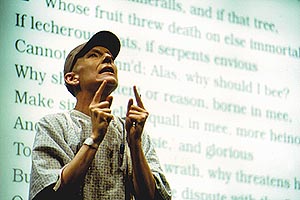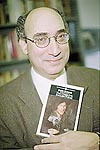Pulitzer Prize-winning play that cites writings of Professor Strier comes to the Goodman Theatre
By Arthur FournierNews Office
 Vivian Bearing (Carmon Roman) dissects a John Donne poem in the Goodman Theatre’s Chicago premiere of Margaret Edson’s |
On Monday, May 21, Margaret Edson’s Pulitzer Prize-winning drama Wit, opened to the public at the Goodman Theatre. The production, which will continue through Saturday, June 16, is the play’s Chicago premiere.
 Richard Strier |
Wit presents the character of Vivian Bearing, a professor of 17th-century English poetry who is diagnosed with ovarian cancer. An uncompromising scholar, Bearing has mastered John Donne’s most difficult poetry, taught demanding courses and allowed herself little time to cultivate personal relationships outside of the ivory tower. Faced with her own mortality, she reassesses her life and work.
Wit cites Strier’s scholarship on Donne’s Holy Sonnets, poetry to which Bearing turns for comfort in her darker moments. “She’s looking for a kind of spiritual sustenance that will ease her suffering,” said Strier. “She has trouble finding it in the poems, and ultimately, she has to venture beyond her intellectual world to come to terms with her death.”
Strier said the plot dynamic echoes certain themes of his essay John Donne Awry and Squint: The “Holy Sonnets,” 1608-1610, where he argues that Donne––a Roman Catholic by birth––was fundamentally unable to find comfort in his later theological position of Protestantism.
The cast and crew of the Chicago production of Wit invited Strier to discuss his work on Donne during a recent session prior to rehearsal. “I expected to provide them with a few brief remarks,” recalled Strier. “Instead, we discussed Donne for more than two hours. They really got into it.”
Since Wit’s debut at South Coast Repertory in 1995 and subsequent off-Broadway runs, the play has earned a number of awards, including the Drama Critic’s Circle Award, the Drama Desk Award and the 1999 Pulitzer Prize for Drama.
Not long ago, the few popular plays that featured artists or intellectuals tended to portray them as eccentrics or to focus on well-known figures of genius, such as Picasso, Einstein, Galileo or Shakespeare. Now that academic dramas like Wit, alumnus David Auburn’s Proof and Copenhagen (which will have its Chicago debut at the Schubert Theatre in winter 2002) have hit the mainstream, dramatic portrayals of intellectual life have achieved a greater depth and complexity.
Strier mused that the plays’ successes may mean that intellectuals are being assimilated more and more into the fabric of the general culture. “Pretty much everyone who belongs to the middle class in the United States has had some contact with the academy through his or her years in college,” he reasoned. “It seems to me people may be developing a sense for the fact that life in the professorate has its own dramas and intensities, that it’s not just a world of eccentrics.”
He thinks the public may now be on to something scholars have known for years. “One of the great secrets of the academy is that really learning something––anything, really––can be incredibly exciting,” he explained. “For those of us in the business, the ecstatic experience that makes you whisper to yourself, ‘I’ve got it!’ is at the center of our lives.
“The great thing about the University is that here, the secret is out,” he continued. “The academic pursuit is a brand of hedonism, really––in the nontrivial sense of fun.”
University faculty, students and staff may purchase discounted tickets for a performance of Wit at 7:30 p.m., Thursday, May 31, by calling the Reynolds Club box office at (773) 702-7300. For further ticket information, call the Goodman Theatre at (312) 443-3800.
![[Chronicle]](/images/small-header.gif)